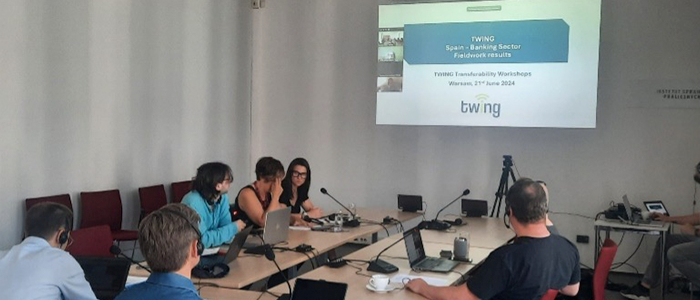Transfer of good teleworking practices between Spain and Poland in the framework of the TWING project.
The TWING project (November 2022 – October 2024) is a research project supported by the European Commission, which aims to explore the impact of the COVID-19 crisis on telework, working conditions and industrial relations. By analysing four sectors (ICT, banking, chemical industry and public administration) and six countries (Austria, Estonia, Finland, Spain, Poland and Portugal), a comparative analysis is being carried out to enable the development of relevant policy recommendations at European level. As part of the research, the potential for transferability of good telework and telework negotiation practices identified in the different national and sectoral contexts is being explored. To achieve this, an action-research approach is used, involving relevant actors from the six countries studied and from different sectors. To facilitate mutual learning, three transnational workshops are organised (Spain and Poland, Austria and Portugal, Finland and Estonia) in which the partners involved actively participate in the exchange and discussion of their experiences in implementing and negotiating telework. The joint reflection aims at building consensus on effective recommendations.
A transnational workshop between Spain and Poland, led by Notus and the Institute of Public Affairs of Poland (IPA), was held in Warsaw on 21 June. The social partners invited were, from Spain, two trade unionists from the pharmaceutical sector and one trade unionist from the financial sector; and from Poland, two trade unionists from the technology consultancy sector and two trade unionists from the financial sector. Both countries have recently introduced telework legislation (Spain in 2020 and Poland in 2022), which made the comparison particularly interesting. During the session, trade unionists from each sector in each country presented cases of telework regulation in their respective companies. Interesting approaches were presented, such as combining flexitime with telework arrangements, effective results-based forms of evaluation and regulations ensuring equality between teleworkers and non-teleworkers (in aspects such as access to telework, financial compensation and provision of means).
Limited potential for transferability was found, with more potential from the Spanish to the Polish cases, due to the limited role of collective bargaining in Poland. Co-ordination between sectoral and company collective bargaining was considered indispensable for the regulation of productive and decent telework. Seeing how similar and effective telework regulations were achieved in the banking sector in both countries, it was concluded that an impulse from European trade union federations could help the transferability of good practices between the countries, especially in sectors with less social dialogue, such as the IT consultancy sector.



Comments are closed.